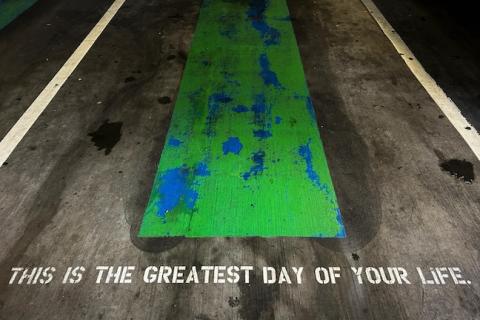‘You are not your car’: At this parking garage, every space gets a pearl of wisdom
Written by Astrid Kane Published Feb. 03, 2024 • 8:00am for the SF Standard
"You are one of the great lovers.”
“Relax. You’re already there.”
“You can’t have everything. Where would you put it?”

The messages—some uplifting, some cryptic—sound as though they could have been sealed inside a fortune cookie at a Chinese restaurant. But they’re found in a place more closely associated with motor oil than chili oil.
Anyone who’s parked their car North Beach Garage at 735 Vallejo St. may have noticed that the spaces aren’t identified in the typical way, with rows of white numbers painted onto concrete. Instead, they’re labeled with warm wishes and practical advice.
The 20-year-old structure owned and managed by the San Francisco Municipal Transportation Agency has almost 200 spaces across five color-coded levels, each with a message that can sometimes sound like the advice that swims up from a Magic 8-Ball (“Keep your plans secret for now”) or the banal exuberance of a life coach (“No one can make you feel bad without your consent”).
They’re mostly positive predictions of imminent happiness, even if a few almost sound like you maybe shouldn’t get behind the wheel (“A party is going on inside you”). There’s a little bit of paternal tough love (“Avoid fatigue”) mixed in with quotations that could have been ripped from Chairman Mao himself (“Prosperity is just around the corner”).
Most parking garages are echoey, poured-concrete bunkers that give people the creeps late at night. So who thought to do so something so whimsical?
Back in 2002, artists Jon Rubin and Harrell Fletcher were commissioned by the San Francisco Arts Commission to create 191 fortunes in all, each stenciled in all-caps. They also installed another artwork on the site, enlarged photographic portraits of historically prominent North Beach and Chinatown residents.
“The idea was just that the random act of finding a parking space would also provide a ‘fortune’ to contemplate,” said Fletcher, who lives and works in Portland. “The whole thing was held up for a few years because of an attempt to prevent the parking lot from being built.”
Like Fletcher, Rubin is both a working artist and a college professor. He recalled their interest lay in playing up the serendipity of where people park—although they didn’t fully execute the work themselves.
“We produced the stencils,” he said from his current home in Pittsburgh. “We allowed the guys who built the garage to decide which ones went where. We didn’t lay them out. We just let the workers decide and have fun with it.”
Neighborhood icons got involved in the project's genesis, too: Barbara Stauffacher Solomon, a North Beach resident who all but created the art genre of supergraphics in the 1960s, helped select Rubin and Fletcher from three finalists competing for a city art grant to fund the project. (She’s still working at 95, and the exhibition “Barbara Stauffacher Solomon: Strips of Stripes,” is currently on view at SFMOMA.)
A spokesperson for San Francisco’s transit agency confirmed that the initial funds for the parking lot art came from a cultural enrichment ordinance, which allocated 2% of the construction budget for any new or renovated city structure.
Fletcher and Rubin’s completed project, though fully sanctioned by the city, carries a whiff of guerilla street action—in spite of their chosen typeface’s curiously tame name, HouseBroken. “You are not your car” is a fortune, although the signs reading “Please Take Ticket With You” are actually just a little nudge to help drivers avoid the $36 maximum rate.
Willie Brown officially dedicated the North Beach Garage on Feb. 7, 2002. The artists received a $40,000 commission for both pieces, each taking home about one-tenth of that after costs. As far as maintenance goes, the garage is responsible for day-to-day upkeep, and the transit agency oversaw a repainting of the roof level’s fortunes in 2006. Exposed to sun and wind, they’re mostly illegible again.
Rubin, who travels back to San Francisco from time to time but hasn’t stopped by the garage, is zen about some of it fading into obscurity.
“I like that it’s certainly dissociated from our authorship,” he said. “That was never really that important.”
Then what is important? Depending on where you stashed your Altima, it could be this gently defiant piece of advice: “The great pleasure in life is doing what people say you cannot do.”
